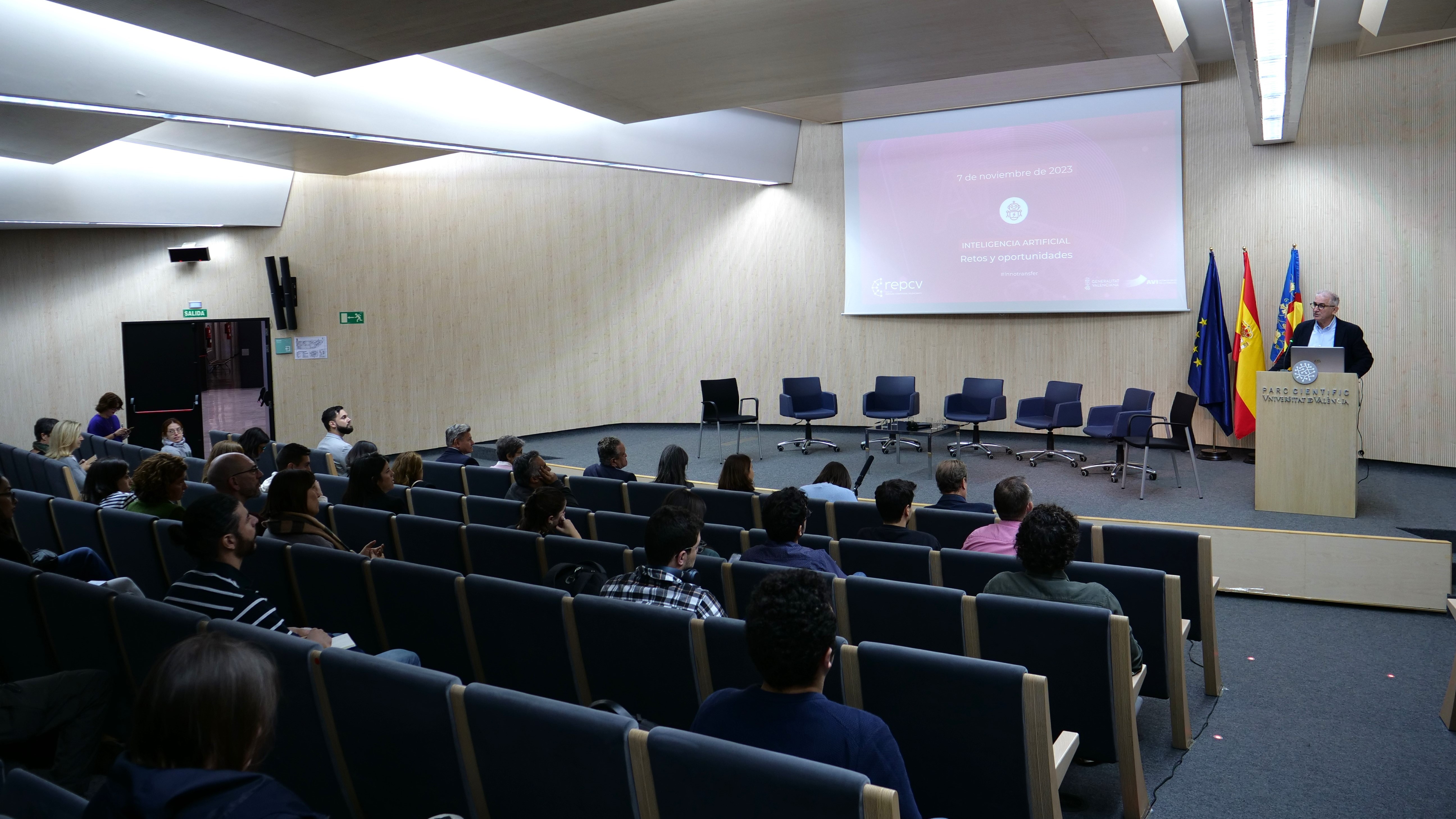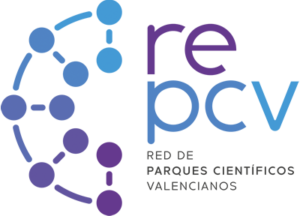Companies, research groups and reference entities in Artificial Intelligence analyze the keys to the industry in the third event of the year organized by the Science Park of the University of Valencia in the framework of Innotransfer, an open innovation program promoted by the five Valencian science parks with the support of the Valencian Innovation Agency (AVI)
According to AVI's Strategic Committee for Specialized Innovation (CEIE), the conference responds to the need for automation of industrial processes, prediction of a company's future needs, as well as the optimization of such precious assets as water and associated goods.
Artificial Intelligence is a technology that is in a moment of exponential growth, which in recent times, is generating new opportunities and challenges, but also uncertainties. This fact has generated the need for the adoption of measures to ensure an integrated application in a transversal and egalitarian way in society. This was one of the many points that were highlighted at the meeting Artificial Intelligence: Challenges and Opportunities, which was held on November 7 at the Marie Curie Auditorium of the University of Valencia Science Park of the (PCUV) within the open innovation program Innotransfer, which is supported by the Valencian Innovation Agency (AVI).
In this line, Pedro Carrasco, director of the Science Park, gave a welcoming speech in which he highlighted the "objective" of the conference: "That future collaborations in the field of Artificial Intelligence come out of here". "The celebration of this conference takes place in a context in which Artificial Intelligence is growing and therefore, expectations, challenges and opportunities are being generated, but also uncertainties and implications that demand the adoption of measures to ensure an integrated, egalitarian and transversal application of this tool," he said.
In addition, the director of the PCUV added that, according to the latest report by the human resources consulting firm Adecco, "73% of Valencian workers already use AI in their workplace, although only 44% of them claim to have received training on this technology from their employers", so he warned that "the challenge for companies that already apply this technology is that people receive information and know what are the appropriate limits for the use and capabilities provided by the tool."
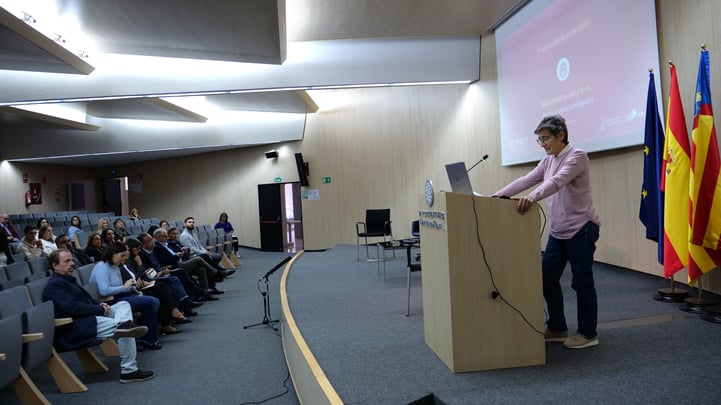
Rosa Donat, vice-rector of Innovation and Transfer of the University of Valencia, during the Innotransfer conference. Photo: FPCUV
In welcoming the event, Rosa Donat, Vice Rector for Innovation and Transfer of the University of Valencia, stressed the "transformative power of an emerging tool" such as artificial intelligence. "This event focuses on bringing challenges, opportunities and solutions related to Artificial Intelligence in sectors such as robotics, industrial, analysis, interpretation of massive data, optimization of resources in the management of natural resources and perspectives of AI regulation from the legal field," explained Donat. Also, the vice rector for Innovation and Transfer emphasized the ability of Innotransfer events to "bring together in the same space diverse voices, both from the academic and business environment".
The impact of Artificial Intelligence on the competitiveness of companies is the subject of study, and to show it, Donat relied on the report 'Artificial Intelligence and its impact on business productivity', published by HubSpot, and in which it is noted that "66% of Spanish companies have already invested in Artificial Intelligence to optimize their processes. And 64% of SMEs that incorporate it report a significant increase in the productivity of their employees. Likewise, 55% of the participants surveyed point out that this technology will be essential in the very near future to offer sufficient competitiveness in the different markets." "There is no doubt that this is already a key sector for the economy of the Valencian Community," she concluded.
"66% of Spanish companies have already invested in Artificial Intelligence to optimize their processes. And 64% of SMEs that incorporate it report a significant increase in the productivity of their employees", Rosa Donat, Vice Rector for Innovation and Transfer of the University of Valencia
Consuelo Barrantes, innovation agent in the framework of the Innotransfer program at the FPCUV, emphasized the different applications of Artificial Intelligence, a tool that "is not something new", as she pointed out that "in the 50s, Alan Turing asked us the question: "Can machines think? "The Artificial Intelligence that currently surrounds us gives us back almost truthful information, as for example, the case of Chat GPT. Broadly speaking, we are dealing with a robot, a virtual entity," she added.
"Currently, as we can see, Artificial Intelligence, we have it introduced in our day to day, but we must not forget that we are working with a virtual entity, it is not a person," she warned, while exposing that "Artificial Intelligence, consists of a set of defined and unambiguous rules that allow us to solve a problem, process data or perform certain tasks requested. These rules are applied by what are known as computer algorithms, which are programming languages".
Artificial Intelligence: Data and Image
The need to apply Artificial Intelligence in start-ups and in the most established companies, currently becomes a fundamental lever for the subsistence and competitiveness of companies in a changing and uncertain market. Moreover, in this context, companies are immersed in and contributing to the transformation of social and cultural innovation, which undoubtedly poses a very attractive challenge for organizations.
Thus, Carles Igual, co-CEO Kimera Techonologies, explained that his company works in search, recommendation and data indexing processes, that is to say, the objective of Kimera Technologies with respect to Artificial Intelligence, is to simulate that "there is another person within the companies' team". In this line, Igual explained that with AI, "what you knew yesterday, today is no longer valid", a situation that he advocated overcoming "with an open mind, since we do not know what may come". "AI is a tool and like every tool it can be very good or very bad, it depends in whose hands it is," he pointed out.
From the field of research, Gustau Camps, professor of Electrical Engineering at the University of Valencia, pointed out that from the research point of view "Artificial Intelligence is nothing more than statistics with a bit of steroids, since it only predicts, it does not answer questions, it does not answer the why". Currently, he said, they were developing algorithms that were "interpretable and explainable", a point that Camps said was very important for AI, because "it should go beyond not only predicting, but also explaining". For his part, José María Sempere, scientific director of VRAIN - UPV, advocated "making a training effort at all levels", in fact, he warned that "an instruction manual on Artificial Intelligence for citizens is urgently needed", although he does not forget the university environment since he said that "at the UPV we are going to propose a specific degree in AI because these are the times that are coming up".
"We have a magnificent human capital and in abundance. Moreover, it is very well trained, but the problem is to retain the 'Messi', because there is enormous competition in international terms," Andrés Pedreño, founder of Torre Juana OST
In this sense, Andrés Pedreño, founder of Torre Juana OST, supported Sempere's words, and stressed that "we should educate the entire population" in Artificial Intelligence, although he warned that on many occasions "regulation is confused with education", and to combat this, Pedreño advocates training "more managers specialized in AI" and "empowering people and introducing them to responsible and marketable AI". "We have magnificent human capital and in abundance. Moreover, it is very well trained, but the problem is to retain the 'Messi', because there is enormous competition in international terms", and he also stressed that "if this country trained a million ESTEMs, a million ESTEMs would have jobs, because foreign investment would come".
Cristina Baixauli, director of Dinapsis Valencia, stressed that in the Valencian Community "we have the muscle to develop many projects, which often remain in pilot", so she emphasizes that "we must ensure that these projects are developed". In addition, she warned that "the talent drain is evident", in fact, she explained that for them "it is very important to find great professionals at a technical level, but these people must be trained in the knowledge of what we do and why we do it". "It is very difficult for us to train people so that they can then bear fruit in terms of business development". Along the same lines, Vicent Girbés, scientific researcher at UV in the HRI group, pointed out that it is necessary for engineers "if they are going to go out into a labor market in which things are going to be moved by AI, it would be essential to have transversal training in the subject", so he insisted on "the need to train in AI and review the curricula to train specifically in this tool.
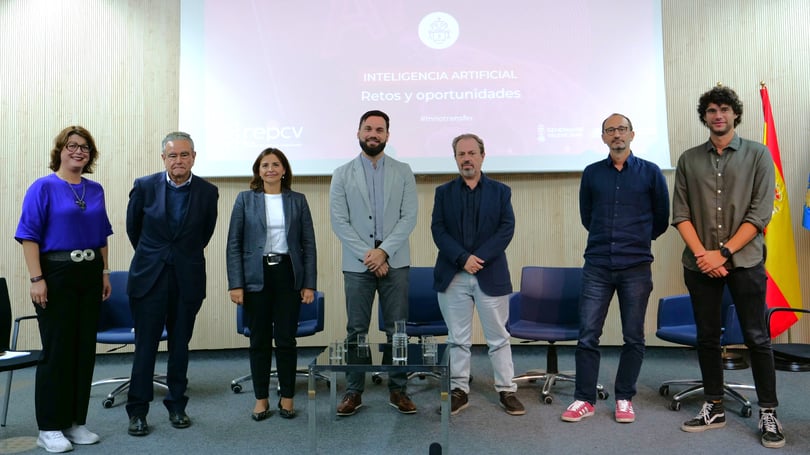 (From left to right) Kristin Suleng, head of Communication and Marketing of the FPCUV; Andrés Pedreño, founder of Torre Juana OST; Cristina Baixauli, director of Dinapsis Valencia; Vicent Girbés, UV scientific researcher in the HRI group; José María Sempere, scientific director of VRAIN - UPV; Gustau Camps, professor of Electrical Engineering at the Universitat de València; Carles Igual, co-CEO Kimera Techonologies. Photo: FPCUV
(From left to right) Kristin Suleng, head of Communication and Marketing of the FPCUV; Andrés Pedreño, founder of Torre Juana OST; Cristina Baixauli, director of Dinapsis Valencia; Vicent Girbés, UV scientific researcher in the HRI group; José María Sempere, scientific director of VRAIN - UPV; Gustau Camps, professor of Electrical Engineering at the Universitat de València; Carles Igual, co-CEO Kimera Techonologies. Photo: FPCUV
Artificial Intelligence: Data and Business
As for Artificial Intelligence more applied and focused on the company, representatives such as Raul Soriano, CEO Next AI, put on the table the problem of applying AI in all companies, both startups and more established ones, and is that as he defended, "Artificial Intelligence is for people who think young". Thus, during his implementation work in organizations, he detected that "the biggest challenge they face when introducing AI is people", because, as he points out, "they are the ones who have to manage it". In fact, he pointed out that "there are many employees who are reluctant to AI", but he warned that "Artificial Intelligence will not take your job, but someone who knows how to use AI better than you will" and added that "anyone who does not want to update will be passed over."
Ángel González, co-founder and marketing director at Datipic, wondered what needs to be done to be able to use the tools that implement Artificial Intelligence. He emphasized "training people so that they can use all these tools and get used to this ever-changing environment". In this line, he stressed that "it would be necessary to lower the level of development of AI and let people adapt". Alejandro Rubio, ITE researcher, stressed the need to "involve companies in the AI development process". In fact, he stressed that it is necessary to "work on a strategic plan in the company to facilitate the decision-making process in changing environments", as he added that "we cannot leave anything out because there are areas of AI that we do not know how it will evolve in the future."
"Artificial Intelligence is not going to take your job, but someone who knows how to use AI better than you," Raúl Soriano, CEO Next AI
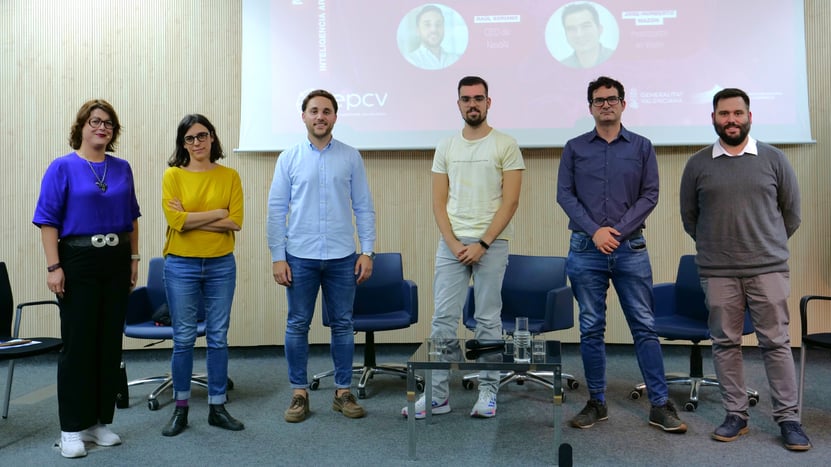
(Left to right) Kristin Suleng, head of Communication and Marketing at FPCUV; Elisa González, researcher at Horta - Basf S.L.; Raúl Soriano, CEO Next AI; Ángel González, co-founder and marketing director at Datipic; José-Norberto Mazón, professor at the Department of Computer Languages and Systems of the UA; Alejandro Rubio, ITE researcher. Photo: FPCUV
Finally, Elisa González, a researcher at Horta - Basf S.L., explained that "it is unethical to offer companies services that are not yet known to be reliable", referring to the agricultural sector. He also pointed out that in his company they carry out basic research, which allows them to develop algorithms, although of all of them, the only ones they are interested in are "the explainable ones", that is, the processes that they are able to demonstrate with data and evidence, so he stressed that despite AI "data acquisition still has to be manual". In this sense, José Norberto Mazón, professor of the Department of Computer Languages and Systems of the UA, pointed out that "the raw material of AI is based on data and I think we are not giving the importance it deserves to data", and also added that "25% of the cost of the projects is to find data". Finally, he indicated that "the goal of Artificial Intelligence is to solve problems", from which he pointed out that "new jobs will emerge."
Closing
Rafael Marimón, Professor of Commercial Law at the UV, brought the Innotransfer day to a close. During his speech, he deepened on AI in the legal field and exposed use cases along with regulatory perspectives. During the first part of his presentation, he showed examples of how Artificial Intelligence was beginning to be part of this sector, even having the power to make decisions in sentences and votes in countries like China. As for the European Union, he focused on the proposed European Law on AI, which is about to be approved. It advocates that "AI must be a human-centered technology. It should not replace human autonomy."
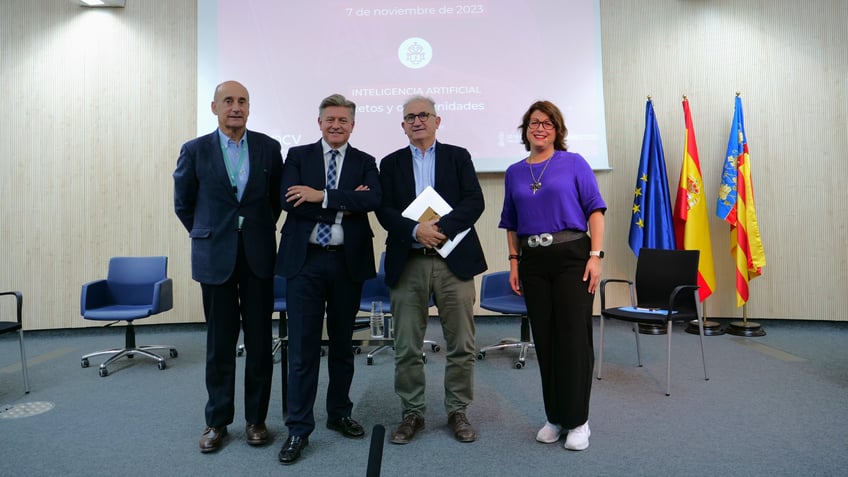 (Left to right) Fernando Mª Zárraga, manager of the FPCUV; Pedro Carrasco, director of the PCUV; Rafael Marimón, professor of Commercial Law at the UV; Kristin Suleng, head of Communication and Marketing of the FPCUV. Photo: FPCUV
(Left to right) Fernando Mª Zárraga, manager of the FPCUV; Pedro Carrasco, director of the PCUV; Rafael Marimón, professor of Commercial Law at the UV; Kristin Suleng, head of Communication and Marketing of the FPCUV. Photo: FPCUV
With the support of:


